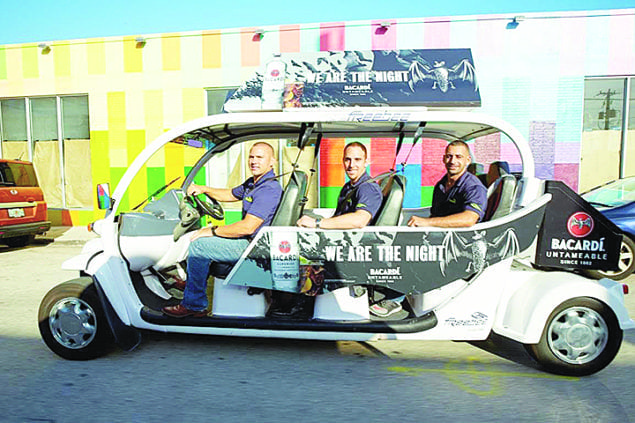
It has often been said that there’s no such thing as a free ride. Jason Spiegel, Kris Kimball and Matt Friedmann beg to differ, and took this challenge head-on when they founded Freebee in 2012. The company offers free short-distance transportation in custom electric vehicles, shuttling tourists and locals around high-density areas of Miami. Revenue is generated through advertising placement on its vehicles, and business has been growing steadily every year. Freebee is profitable and expanding, and the partners are very excited for the future of the business.
Freebee’s 30+ “green” vehicles serve Miami’s Brickell, Downtown, Wynwood, Midtown and Design District neighborhoods, as well as Miami Beach and Hallandale. Similar to Uber, customers order rides on-demand through the “Ride Freebee’’ mobile app, or they can flag down any passing Freebee vehicle. The cars are easy to spot, as each Freebee is emblazoned with a client’s brand, including backlit advertising panels. Freebee’s employed drivers often offer riders local recommendations and product samples from their advertisers. “We are a marketing company, utilizing free transportation as our advertising platform,” Spiegel says. The 42-employee company’s stable of high-profile clients includes brands such as Bacardi, Capital One, Pepsi, Goya and Anheuser-Busch.
Freebee’s founders are all from the Philadelphia area, but didn’t meet until they were students at the University. However, the idea for Freebee didn’t come together until several years after the trio graduated. Friedmann took a job with Royal Caribbean, while Spiegel and Kimball worked in phone sales, but they were constantly brainstorming about how to build their own company.
“We went through several ideas. We asked ourselves, ‘What would be something fun that would serve the well-being of the community?’” Kimball says. Kimball, Spiegel and Friedmann have invested their life savings into the company and have chosen not to take on an investor to date, as the company is profitable. Just recently, Miami-Dade County awarded Freebee a $175,000 economic grant.
As Freebee grew, Kimball and Spiegel started a printing and creative design division, Beefree Media, and recycled all Beefree profits into more vehicles and technology development. Now, through the data collected via its app, Freebee knows which restaurants and clubs are trending – and suggests these “Places to Bee” to riders.
The trio credits their School of Business education with giving them entrepreneurial tools and undergirding their tenacity. Friedmann says Ian J. Scharf, a lecturer in the School’s marketing department, was particularly inspiring, saying: “He taught us about marketing ourselves and balancing our work-life priorities.” Kimball adds, “What we learned at UM gave us the confidence to get out there and schedule our first meeting. From there, we were off and running.”






